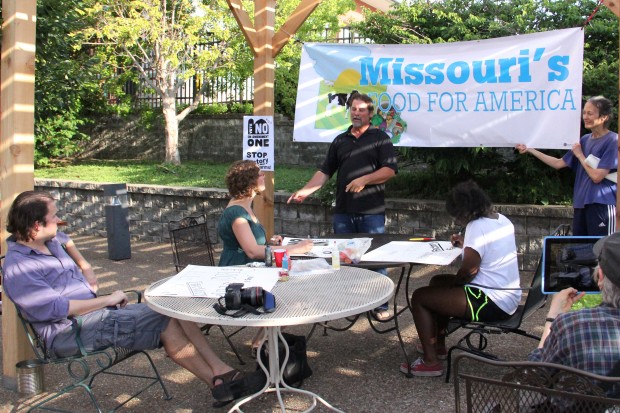
Attendees listen as former Missouri state senator Wes Shoemyer speaks against Amendment 1 at the Missouri’s Food for America sign-making event at Café Berlin Friday, June 27, 2014 in Columbia, Missouri.
KOMUnews / flickr


Attendees listen as former Missouri state senator Wes Shoemyer speaks against Amendment 1 at the Missouri’s Food for America sign-making event at Café Berlin Friday, June 27, 2014 in Columbia, Missouri.
KOMUnews / flickr

KOMUnews / flickr
Attendees listen as former Missouri state senator Wes Shoemeyer speaks against Amendment 1 at the Missouri’s Food for America sign-making event at Café Berlin Friday, June 27, 2014 in Columbia, Missouri.
A bill that would allow voters to decide if the state Constitution should be changed to guarantee “the right of farmers and ranchers to employ agricultural technology and livestock production and ranching practices” passed the Oklahoma House of Representatives without debate Thursday.
It now heads to the Senate, where it’s also expected to meet widespread support.
Right-to-farm is a controversial national issue that barely passed in Missouri in November 2014. The effort pits agricultural interests against, specifically, the Humane Society of the United States, which House Joint Resolution 1012‘s author, Scott Biggs, R-Chickasha, mentioned when introducing his bill on the House floor:
“This is a preemptive issue against HSUS, which is the group that has sued the attorney general, the same group who’s protesting the moving of two elephants to the Oklahoma City Zoo. The same group that is under investigation for fraudulant financial practices relating to the Moore tornado,” Biggs said in response to a question from Rep. Mike Shelton, D-Oklahoma City.
Oklahoma Attorney General Scott Pruitt is investigating whether the Humane Society improperly fundraised following the May 2013 Moore tornado, a charge the group vehemently denies and is suing Pruitt over.
Supporters feel a right-to-farm amendment is necessary to prevent Humane Society-backed anti-GMO laws and chicken-caging regulations similar to ones the group has pushed for in California and Oregon.
But opponents say right-to-farm has nothing to do with small farmers rights, and everything to do with letting big ag do whatever it wants.
“They want to do business the way they want to do it, without regard to environmental concerns, animal welfare,” Cynthia Armstrong with the Oklahoma chapter of Humane Soceity told StateImpact last month. “They don’t want any of that getting in their way.”
Even if right-to-farm gets through the legislative process, it wouldn’t appear on the ballot in Oklahoma until November 2016.